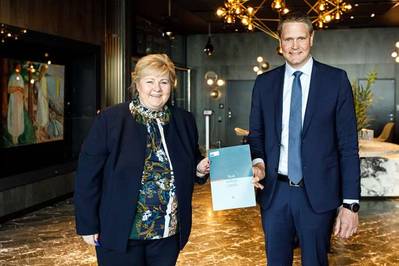Norwegian Shipowners Commit to Carbon Neutral Fleet by 2050
Norwegian shipowners have laid out plans to make the country's fleet entirely climate neutral by 2050, surpassing the International Maritime Organization's (IMO) target to halve shipping emissions within the same timeframe.
The Norwegian Shipowners' Association on Tuesday revealed its member shipping companies have adopted four goals to reduce their environmental footprint. Members will first cut their greenhouse gas emissions by 50% per transported unit by 2030, compared to 2008. From 2030, members will only order vessels with zero emission technology. From 2050, the Norwegian fleet will be climate neutral. The strategy also entails an international ban from 2050 on fuel types that are not climate neutral.
"Norwegian shipping is taking a leading role by setting ambitious goals for the development of new and profitable green technology," said Harald Solberg, CEO of the Norwegian Shipowners' Association. "We have high ambitions, even in areas that today do not have commercially available technological solutions. We believe ambitious goals will help accelerate the necessary development. This means that the entire industry, in collaboration with the authorities, both nationally and internationally, must engage in developing new solutions."
"The aim of the Paris Agreement is to limit global warming to 1.5 degrees. The UN Intergovernmental Panel on Climate Change has given us 10 years to halve greenhouse gas emissions, and maintains that they must drop to zero by 2050. Climate change must be taken seriously. If we are to succeed in curbing its effects, we must act quickly," the association said in a statement.
While the initiative aims to minimize shipping's environmental impact, the association believes that what's good for the envionment is also good for business, pointing to new opportunities and job growth generated through the development of innovative clean technologies needed in Norway and throughout the world.
"We need new technology and new sustainable solutions, and development must happen quickly," Solberg said. "We can meet global climate targets while generating business opportunities. We have already accomplished a great deal, and now we want to do even more."
Globally, shipping accounts for roughly 2.2% of greenhouse gas emissions. In April 2018, the IMO's Marine Environment Protection Committee (MEPC) adopted an initial strategy to reduce ships' total annual greenhouse gas emissions by at least 50% by 2050 compared to 2008, while, at the same time, pursuing efforts toward phasing them out entirely. Others around the world have since outlined plans to surpass this target, such as shipping giant Maersk, who in December 2018 said it aims to cut net carbon emissions to zero by 2050.














